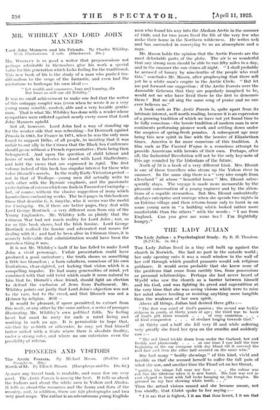PIONEERS AND VISITORS
ALMOST any travel book is readable, and some few are very good. The Arctic Forests is among the best. It tells us about the Indians and about the white men in Yukon and Alaska. It tells us about'the resources and the fauna and flora of the country, and, in addition, there are 120 photographs and two very good maps. The author is an adventurous young English-
man who found his way into the Alaskan Arctic in the summer of 1920, and for two years lived the life of the very few who snake their home in the Northern wilderness. He writes well and has succeeded in conveying to us an atmosphere and a saga.
Mr. Mason holds the opinion that the Arctic Forests are the most delectable parts of the globe. The air is so wonderful that any strong man should be able to run fifty miles in a day, and in the summer the sun shines all night. " I shall probably be accused of lunacy by nine-tenths of the people who read this," concludes Mr. Mason, after prophesying that there will yet be a white man's empire in the Arctic Circle. " But let me put forward one suggestion : if the Arctic Forests were the damnable Gehenna that they are popularly imagined to be, would not we who have lived there be the first to denounce them ? But we all sing the same song of praise and no one ever believes us."
A book such as The Arctic Forests is, quite apart from its intrinsic interest, well worth reading, because it is an expression of a growing tradition of which we have not yet found time to be fully conscious—the heroic tradition of modern man in new continents performing pioneer work and settling down under the auspices of spring-fresh penates. A subsequent age may bring this new spirit in line with the heroics of Elizabethan times. America is far more conscious of this tradition. A film such as The Covered Wagon is a conscious attempt to provide Americans with heroics of their own. Perhaps, after all, the Industrial Revolution will not be the only key-note of this age sounded by the historians of the future.
North of 53 is a book of a very different kind. Mrs. Blount is one of those travellers who steam up the Yukon river in summer. In the same ship there is a " very nice couple from Cleveland " at whose " beautiful house " Mrs. Blount subse- quently stays. The voyage is made more memorable by the pleasant conversation of a young engineer and by the atten- tions of a capable stewardess. But Mrs. Blount undoubtedly displays enterprise and courage when she spends two nights in an Eskimo village and then returns home only to burst in on some young men in " a building which looked rather more comfortable than the others " with the words : " I am from England. Can you give me some tea ? I'm frightfully hungry."










































 Previous page
Previous page